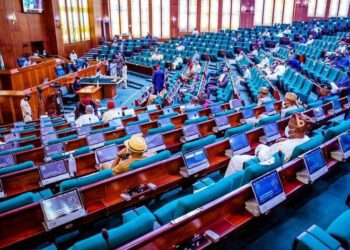The National Assembly has secured the assent of President Bola Ahmed Tinubu to bills establishing the Federal University of Technology and Environmental Sciences in Iyin-Ekiti, Ekiti State, and the Federal University of Agriculture and Development Studies in Iragbiji, Osun State.
The Leader of the Senate, Senator Opeyemi Bamidele, revealed the president’s decision yesterday after he signed the two legislations at the State House, Abuja.
Bamidele had sponsored the bills to establish the Federal University of Technology and Environmental Sciences in Iyin-Ekiti Kingdom, Ekiti State, and the Federal University of Agriculture and Development Studies in Iragbiji, Osun State, in 2023 and 2024, respectively.
He initiated the bills with a strong conviction that they would help bridge the knowledge gap in science, technology, and innovation required for national development, promote environmental sustainability and climate action, and enhance agricultural innovation and food security in the country.
Given their strategic national significance, the upper chamber passed the two bills into law and secured the concurrence of the House of Representatives, prompting the president to approve them.
After the signing, Bamidele described the president’s decision as a defining and significant step in the administration’s efforts to address food insecurity and climate change challenges in the country.
He commended the president for approving the establishment of the two federal universities, which have a specific mandate to address knowledge deficits in environmental technology and promote innovative research in food security and agricultural production.
Before the president’s assent, the Minister of Education, Dr. Tunji Alausa, had strongly recommended the establishment of the Federal University of Technology and Environmental Sciences in Iyin-Ekiti, Ekiti State, and the Federal University of Agriculture and Development Studies in Iragbiji, Osun State.
In a letter to the presidency on Wednesday, February 19, the education minister urged the president to approve the establishment of the two universities as passed by the National Assembly.
Regarding the Federal University of Technology and Environmental Sciences in Iyin-Ekiti, the minister stated that the Federal Ministry of Education had reviewed the bill and confirmed that it met all requisite guidelines and standards for establishing a federal university of its kind.
“The university will specialize in technology-driven education and research, producing graduates equipped with 21st-century skills in engineering, digital innovation, and applied sciences. It will drive Nigeria’s industrialization by fostering homegrown technological solutions for economic growth and job creation.
“The institution will focus on environmental sciences, offering programs that address climate change, renewable energy, waste management, and sustainable urban development. It will serve as a research hub for developing policies and solutions that align with Nigeria’s commitment to global environmental sustainability goals,” Alausa stated.
On the Federal University of Agriculture and Development Studies in Iragbiji, the minister emphasized that the university would serve as a center for advanced agricultural education, research, and innovation, contributing to the country’s food security and sustainable agricultural practices.
“It will develop improved farming techniques, agro-processing methods, and climate-smart agriculture solutions to boost productivity and resilience. The university will integrate agricultural sciences with development studies, training professionals to address socioeconomic challenges in rural areas.
“It will foster entrepreneurship and agribusiness, equipping students with skills for self-employment and wealth creation. The university will stimulate economic activities in Iragbiji and surrounding communities, creating employment and business opportunities.
“The university will serve as a hub for collaborative research with international institutions, government agencies, and the private sector to drive innovations in agricultural sustainability and community development,” the minister added.





















